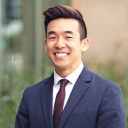Before I joined Lacuna Giving Circle, there was a gap in my personal philanthropy that I couldn’t ignore. My husband—a high school teacher—and I—a nonprofit fundraiser—contributed to several causes we believed in. Until I joined my first giving circle, I didn’t fully appreciate the impact we could have when we give in tandem with others.
Giving circles hit on what we’re missing right now. So many everyday givers see the billionaires of the world and assume that because we don’t have as much to put forward, we can’t make a big enough impact.
Based on the power of giving circles, I can confidently say that is not true.
Lacuna Giving Circle is a devoted group of Asian and Pacific Islander (AAPI) LGBTQ+ community members who wanted to see significant change for our people. I took the membership plunge this spring, shortly after accepting the Director of Development and Partnerships role at Philanthropy Together, an organization devoted to the founding and growth of circles like Lacuna.
The word ‘lacuna’ refers to a gap or an unfilled space, and our target gap is the sizable one in support of AAPI social justice organizations. AAPI organizations receive less than 0.2% of U.S. grantmaking dollars each year. Put another way, for every $100 awarded by foundations for work in the United States, only 20 cents is allocated for AAPI communities. And in this tiny percentage, local grassroots organizations that support marginalized communities—particularly smaller organizations with smaller budgets—are often left in the dust and go unnoticed.
Immediately upon joining, I saw the advantages of giving circles like Lacuna. Because all members are from the AAPI LGBTQ+ community, our lived experiences automatically apply an authentic, intersectional lens to our collective giving and help surface new ways to reach and support local organizations. We amplify voices and stories from our communities and contribute to diverse representation in traditional philanthropy.
The best part is that we are not alone either. Lacuna and Beyond Two Cents are longtime members of AAPIP’s Giving Circle Network. Dinner Guys is a New York-based AAPI LGBTQ+ giving circle, Chicago Foundation for Women’s LBTQ Giving Council, a Jewish gay men’s circle in New York called Kavod, and LGBTQ Latinx Giving Circle in the San Francisco Bay Area are a few examples of giving circles that focus on the marginalized communities that make up their membership.
As giving circles, we can provide nimble, no-strings-attached funding to smaller organizations because we are free from the red tape and reporting requirements that can constrain larger foundations. This type of funding is precisely what community-based groups need to innovate, provide rapid, on-the-ground responses, and continue their important work.
For example, one of Lacuna’s 2018 grantee partners was the Asian Prisoner Support Committee, an organization that provides resources and support to AAPI prisoners. Bay Area Workers Support is a grantee from 2020, and they are focused on fighting for the health, safety, and livelihoods of people in the sex trade.
In my personal philanthropy, I never would have known about these organizations, let alone had the capability to donate beyond a few hundred dollars, simply because I had no connection to these communities. Joining Lacuna has allowed me to understand, celebrate, and empathize with people and communities that are inextricably linked with my values as a queer AAPI man—and contribute toward grants upwards of $5,000 just by throwing my lot in with my friends and allies.
Currently, I’m noticing among my peers that there is a widespread beckoning and call to action to change the way things are in the world. However, dipping a toe into philanthropy to spark change can be so overwhelming that the few dollars we’re able to contribute can feel like fighting a wildfire with a garden hose.
Giving circles offer the opportunity to get involved and feel like you have a whole team alongside you fighting that fire. As circles grow in popularity, organizations like Philanthropy Together offer training programs and resources for circles like Lacuna to further increase their impact. For those new to collective giving, Philanthropy Together’s Launchpad program is a virtual interactive incubator that trains community leaders to start giving circles. We also offer a global giving circle directory, which enables anyone to quickly locate circles in their community, see their impact and charities supported, and connect directly with circle leaders.
In the future, I hope to see LGBTQ+ and other community-serving giving circles go mainstream. They open up more dialogue for critical conversations that we should be having more often and help us practice democracy around a shared meal or Zoom call. Giving circles helped me realize that the path to LGBTQ+ acceptance and celebration doesn’t always have to be tough and gritty; it can be fun, prideful, and spirited in community with others.
The level of joy I find in my giving circle experience is unlike anything I’ve felt in my philanthropy journey, and I am constantly energized by my commitment to Lacuna Giving Circle. Time and more dollars fly when you’re having fun, and this feels less like any other aspect of my life that I’ve committed to. I’m giving a part of me that is nurtured and emboldened by my community.
And I’m sure other members of Lacuna feel the same.
We have a real opportunity in the AAPI LGBTQ+ community to fight for a new way of doing things. When we change the narrative for everyday givers and present new opportunities for communities to come out in support of each other, we move another step closer to an equitable and accepting future for all.
Community knows what community needs. Find your people and let the power of collective giving sweep you off your feet.
Kyson Bunthuwong is Development & Partnerships Director, Philanthropy Together






Comments (0)